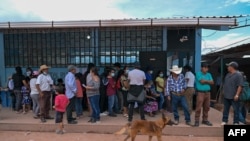Hundreds of Mexicans have migrated to towns on the border with Guatemala due to the unprecedented violence in the Mexican state of Chiapas, following a dispute between drug cartels.
“They are arriving, they all come from Chiapas, taking refuge here. We are going to give them accommodation and we hope that they can help us with food,” says in a video Juan Francisco Méndez, councilor of Cuilco, a Guatemalan town bordering Mexico.
The images show part of the forced displacement faced by some 600 Mexicans fleeing the violence generated by the enmity between the Jalisco Nueva Generación (CJNG) cartel and the Sinaloa cartel.
There is no official number of people who have sought refuge in Guatemala, but Guatemalan President Bernardo Arévalo speaks of 580. While Manuel López Obrador, President of Mexico, estimates between 300 and 500.
“Previously, the Sinaloa cartel dominated the border municipalities of southern Chiapas, but the CJNG has challenged its rival’s power since 2021 with the aim of gaining control over migrant, drug and arms trafficking routes,” InSight Crime, an organization that monitors crime in Latin America, explains in a report.
In addition to fighting for migrant trafficking, cartels also seek to control other illicit economies such as kidnapping, the dispossession of property from the local population, and extortion.
According to InSight Crime, one of the most common types of extortion is the “piso” (floor fee) scheme, through which criminal groups demand a periodic payment from merchants in exchange for security.
What do the authorities say?
According to López Obrador, Mexico is a large country and “there are, as everywhere, conflicts,” referring to the case of Chispas, a state that in 2018 stood out for its low rate of homicidal violence.
It is not as “our adversaries want to see it, that there is ungovernability, that violence prevails, that there is chaos, that the country is being destroyed,” He said at a press conference on July 26after announcing that the National Guard will monitor the area and the situation will be resolved soon.
“It is a fact that in recent times, months, days, even yesterday (July 25), there have been clashes in Chiapas, which unfortunately have caused the loss of human lives,” added Obrador, after acknowledging the affront of two criminal groups in the area.
Several families who crossed into the Cuilco municipality in Guatemala reported to local media that in addition to the constant shootings, they were forced to flee because the cartels forced locals to work at checkpoints where they were used as human shields while they fought against their rivals.
Given the situation, the president of Guatemala, Bernardo Arévalo, announced on July 24 that federal and local authorities are working to house affected families, in coordination with the United Nations Refugee Agency (UNHCR).
“We have been present from the very beginning and we are already collaborating to provide assistance to the refugees,” he explained. He also announced that his government has issued several certificates of humanitarian permanence to the refugees, valid for 30 days and renewable.
Both leaders met in mid-May at the naval air base located in Tapachula, Chiapas, to agree on projects related to security, migration and social support.
Criminal economies in Chiapas
As a border crossing, Chiapas is one of the main routes used by migrants in their quest to reach the United States.
In their attempt to escape the control of the authorities, migrant traffickers often take irregular routes controlled by drug trafficking, where they are exposed to extortion and kidnapping.
According to InSight Crime investigations, large criminal organizations, such as the Sinaloa cartel, charge at least $100 per migrant to allow them to travel on routes controlled by the group.
In fact, some migrants who do not pay for the permit are often kidnapped for ransom from their families, in addition to other abuses committed by the authorities who sometimes conspire with criminal groups.
In addition to controlling migration in the area, the cartels are fighting over drug and arms trafficking routes and extortion.
In December 2023, Local media reported that at least 30% of coffee producers in the Sierra de Chiapas, that is, some 4,000 producers, abandoned their crops in the face of the floor fee, a payment demanded by criminal groups in the area to provide “security” to the inhabitants.
The alternatives for producers are to continue producing coffee and pay extortion, refuse to pay and risk losing their lives, or abandon production and flee the area. At least 9,000 farmers continue to cope with the insecurity.
Violence in numbers
A Report from the Fray Bartolomé de Las Casas Human Rights Center documented the forced displacement of at least 16,755 people between 2010 and October 2022.
Furthermore, from 2021 to date, it is estimated that some 2,000 people (400 families) have abandoned their communities due to the violence generated by the dispute over territorial control by criminal groups.
The year 2024 is shaping up to be the most violent in Chiapas, with more than 400 homicides by the end of July, according to the National Information Center of the Executive Secretariat of the National Public Security System.
Connect with the Voice of America! Subscribe to our channels Youtube, WhatsApp and the newsletter. Activate notifications and follow us on Facebook, X and Instagram.















Add Comment